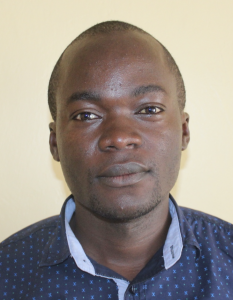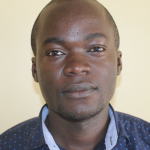The 376 students and 11 staff members at Viyalo primary School have no real source of water. The students must trek far distances over rocky, hilly terrain to collect water from an unprotected spring that makes them sick. Water-fetching is such an odious task that students hide from their parents and teachers and skip class in order to avoid it.

"Since I joined this school, we have really faced challenges concerning access to clean and safe water," explained student Daisy (shown fetching water below). "[This has] really contributed to absenteeism among pupils."

And it's not only the water scarcity that's contributing to missed classes. Students frequently suffer from water-related illnesses due to drinking the unprotected surface water. The most frequent complaints are cholera, typhoid, diarrhea, and sore throats.

"As a teacher from this school, I really spend much of my time supervising pupils to fetch water," said 36-year-old teacher Pascal Magono (shown below filling his water container). "The water source is also not safe for pupils to go [to] alone due to its bushes and strangers on the road. The entire school's hygiene is not done well due to the lack of enough water."

Because fetching water takes so much time and effort, the students fetch less of it than the school really needs. This results in dehydrated students, missed classes, and dirty facilities. This environment hurts students' long-term health and prevents learning rather than contributing to it.
"[We have] poor performance due to [a] lack of enough time to study," said Daisy. "Manual cleaning is not done enough for the entire school, hence [our] hygiene is not up to standard."
A borehole on school grounds will significantly cut down on the amount of time students spend fetching water. The safer water will improve students' health and improve their ability to learn.
What We Can Do:
New Well
We conducted a hydrogeological survey at this school and the results indicated the water table beneath it is an ideal candidate for a borehole well. Due to a borehole well's unique ability to tap into a safe, year-round water column, it will be poised to serve all of the water needs for this school's large population, even through the dry months.
The school will help collect the needed construction materials such as sand, rocks, and water for mixing cement. They will also provide housing and meals for the work team, in addition to providing local laborers. We will complement their materials by providing an expert team of artisans and drilling professionals, tools, hardware, and the hand-pump. Once finished, water from the well will then be used by the school’s students and staff for drinking, handwashing, cooking, cleaning, and much more.
Handwashing Stations
The student health club will oversee the two new handwashing stations we will provide, and make sure they are kept clean and in working condition. The club leaders will fill the handwashing stations with water daily and make sure they are always supplied with a cleaning agent such as soap or ash.
VIP Latrines
We will construct two triple-door latrine blocks using local materials that the school will help gather. Three doors will serve the girls and three doors will serve the boys. All of these new latrines will have cement floors that are designed to be easy to use and to clean. And with a borehole right on school property, there should be enough water to keep them clean.
Training on Health, Hygiene, COVID-19, and More
We will hold a one-day intensive training session with students, teachers, and parents. This training will cover a wide range of topics including COVID-19 symptoms, transmission routes, and prevention; personal and environmental hygiene; and the operation and maintenance of the borehole, latrines, and handwashing stations. There will be a special emphasis on handwashing.
Our team of facilitators will use a variety of methods to train, including participatory hygiene and sanitation transformation, and asset-based community development. We will initiate a student health club, which will prepare students to lead other pupils into healthy habits at school and at home. We will also lead lectures, group discussions, and provide illustrative handouts to teach health topics and ways to promote good hygiene practices within the school including handwashing and water treatment. We will then conduct a series of follow-up trainings before transitioning to our regularly scheduled support visits throughout the year.
We and the school strongly believe that all of these components will work together to improve standards at this school, which will help lead to better student academic performance and will help unlock the opportunity for these students to live better, healthier lives.





 Borehole Well and Hand Pump
Borehole Well and Hand Pump
 Rehabilitation Project
Rehabilitation Project


































